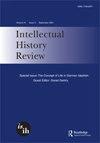Universal Histories
IF 0.5
Q1 Arts and Humanities
引用次数: 0
Abstract
Universal history as an historiographical genre can trace its origins back to the Greek historian Polybius (c. 200–c. 114 B.C.E.), who interpreted the rise of the Roman Republic as the predominant Mediterranean power between 246 and 146 B.C.E. not as an isolated national event but as a world historical event, through which the individual histories of Rome and the territories it conquered were aligned as a single body (sômatoeidês) with a single goal (telos). Slightly later, Sima Qian (c. 145–c. 86 B.C.E.), the court historian of the early Han Dynasty, produced the first Chinese version of a universal history, a chronically and thematically organized account of the two millennia of China’s history from its (legendary) origins to Sima Qian’s own time. Considered abstractly, universal history seeks to account for the complexity of human history in a rational and systematic manner by assimilating individual historical events and phenomena to a general scheme or narrative. There are two fundamental aspects of this process (to which Olivier Pot and Maike Oergel refer in their essays below): the syntagmatic, which follows the chronological succession of events, and the paradigmatic, which identifies connections and patterns among events and thereby establishes the coherence of history as a whole. By virtue of this second aspect, universal history distinguishes itself from chronicle. The genre of universal history has its own history, however, and a principal aim of this special issue of I.H.R. is to explore some of the variety and complexity of that history. The contributors—including the late Maurice Olender, whose death on 27 October 2022 we profoundly regret and to whose memory we dedicate this issue—address questions of form and content, method and aims, explicit and implicit assumptions of selected universal histories. We focus on the seventeenth and eighteenth centuries because, during these centuries, the genre became a preoccupation of Western European historiography precisely as its practice became increasingly problematic, owing to such factors as religious conflict, secularism, scepticism about the universalist claims of reason, and, not least, increasing geographical knowledge and cultural encounters (especially with non-Western societies) through exploration, trade, and colonization. The assumption that history could be theorized holistically, as if from a privileged vantage point outside it, had to contend with expanding empirical evidence of the multiplicity of human languages, cultures, and customs. To an extent, historiographical challenges similar to those that instigated the Greek genre of universal history—the need, with Alexander the Great’s Eastern conquests and the subsequent Roman conquest of Greece, to explain new events, lands, and peoples—later threatened the genre’s continuation and prompted, among the figures examined in the following essays, a rethinking of its basic assumptions and methods. The recognition of human multiplicity simultaneously encouraged and frustrated the identification of principles capable of accounting uniformly for historical developments in世界历史
普世史作为一种史学流派,其起源可以追溯到希腊历史学家波利比乌斯(公元前200年至公元前114年),他将罗马共和国在公元前246年至146年间作为地中海主要大国的崛起解释为一个世界历史事件,而不是一个孤立的国家事件,通过它,罗马及其征服的领土的个人历史被统一为一个单一的主体(sômatoeidês)和一个单一目标(telos)。稍晚一点,汉初的宫廷史学家司马迁(公元前145年至公元前86年)提出了第一部中国版本的通史,这是一部长期而有主题的记述,讲述了从传说起源到司马迁时代的两千年中国历史。从抽象的角度来看,普世史试图通过将个别历史事件和现象同化为一个总体方案或叙事,以理性和系统的方式解释人类历史的复杂性。这一过程有两个基本方面(Olivier Pot和Maike Oergel在下面的文章中提到了这一点):组合,它遵循事件的时间顺序,以及范式,它确定了事件之间的联系和模式,从而建立了整个历史的连贯性。由于这第二个方面,普世史区别于编年史。然而,普世史有其自身的历史,本期《国际人权报告》特刊的主要目的是探索这段历史的多样性和复杂性。撰稿人——包括已故的莫里斯·奥伦德,我们对他于2022年10月27日去世深感遗憾,并将这一问题献给他——解决了形式和内容、方法和目标、对选定的普遍历史的明确和隐含假设等问题。我们关注十七世纪和十八世纪,因为在这几个世纪里,由于宗教冲突、世俗主义、对普遍主义理性主张的怀疑等因素,正是在其实践变得越来越有问题的时候,这一流派成为了西欧史学的重中之重,通过探索、贸易和殖民化,增加地理知识和文化接触(尤其是与非西方社会的接触)。假设历史可以被全面地理论化,就好像从历史之外的一个有利位置出发,这必须与人类语言、文化和习俗多样性的不断扩大的经验证据相抗衡。在某种程度上,类似于引发希腊普遍史流派的史学挑战——亚历山大大帝的东方征服和随后罗马对希腊的征服,需要解释新的事件、土地和民族——后来威胁到了这一流派的延续,并在以下文章中考察的人物中,对其基本假设和方法的重新思考。对人类多样性的认识同时鼓励和挫败了能够统一解释人类历史发展的原则的确定
本文章由计算机程序翻译,如有差异,请以英文原文为准。
求助全文
约1分钟内获得全文
求助全文

 求助内容:
求助内容: 应助结果提醒方式:
应助结果提醒方式:


